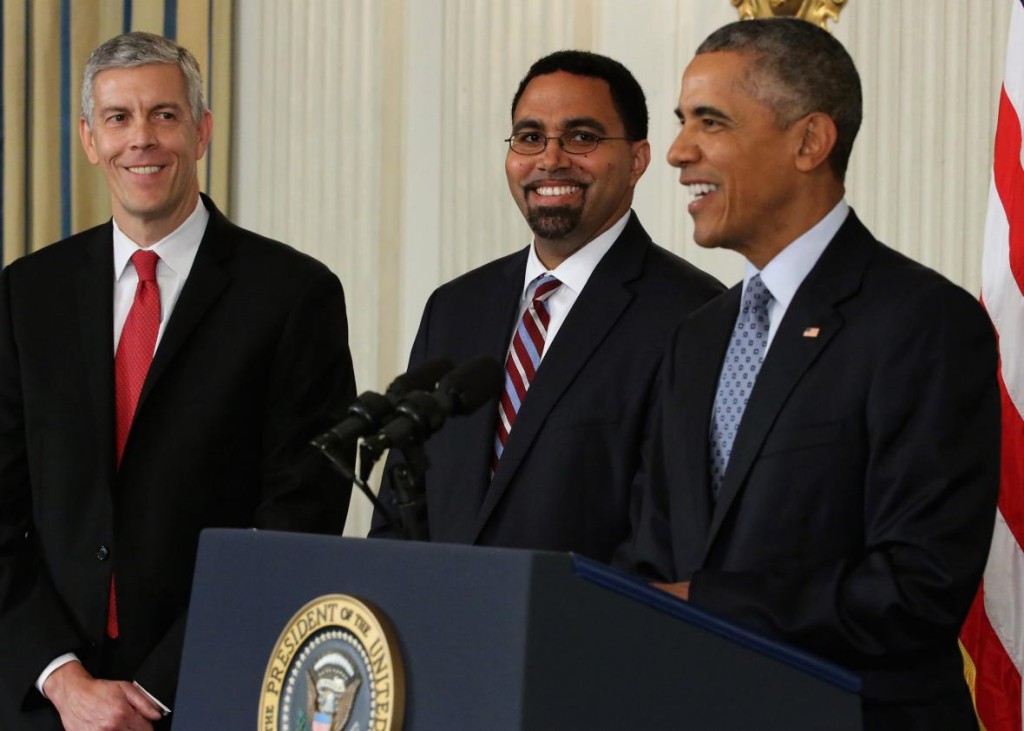During his final stop this week on a tour of schools in four states and the District of Columbia, the acting U.S. Secretary of Education, John B. King Jr., defended the importance of academic achievement testing.
The “Opportunity Across America Tour” brought him Friday to Delaware, a state that was in the national spotlight in 2010 when it earned more than $119 million in federal funding to reform its public schools. The nation’s second-smallest state was among the first – along with Hawaii and Oregon – to use computers for adaptive academic achievement tests, which change the difficulty of questions based on how a student performs. But it is also one of 13 states cited by the federal government last year for low participation on the annual state tests.
It’s important for us to know where we have achievement gaps. It’s important for us to know where our students are making progress. But there are places around the country where there is too much assessment and the assessments are not the quality we want.
— John King, acting Secretary of Education
King praised Delaware and New Hampshire as leaders in making sure tests taken in school are high quality, aligned to academic achievement goals and useful for improving classroom instruction. Local tests required by individual states, districts and teachers are more time-consuming, King said, than federally mandated tests that some parents around the country have rallied to “opt out” of taking.
King began his tenure as acting U.S. Secretary of Education earlier this month. A former New York state commissioner of education, King was orphaned at age 12 and has said that public school teachers saved his life. He became a teacher and a founder of several high-achieving charter schools. But his years (2011-14) leading New York’s education department were filled with controversy – mostly about the implementation of the Common Core standards and his desire to tie them to student and teacher assessment.
In his latest role King has inherited another dispute: a debate about a national testing craze. His predecessor in the U.S. Department of Education, Arne Duncan, pushed for new, computer-based assessments and pressed schools to improve low test scores. More recently, he urged states to be thoughtful about the volume of tests they require.
Delaware is among the states that pioneered using information produced by these computer-based tests to improve teaching and learning. Teachers here can use “data dashboards” to track student scores and create custom-fit, “personalized” lessons for students. But, as it has elsewhere in the country, the scope of testing and data collection has come under fire.
The U.S. Department of Education asked states to scrutinize how many tests students take and to trim unnecessary ones. In Delaware, officials removed standardized assessments from the agenda for 11th graders, who already take the SAT, as this is one of a handful of states where all take the SAT during the regular school day. And they are examining whether other tests can be jettisoned. A panel of teachers, administrators, professors, parents and students has been working to create an inventory of various tests used by schools.
Last year, Delaware’s Gov. Jack Markell, a Democrat known for his willingness to side with conservative-leaning education reform advocates, vetoed a state law that would have allowed parents to “opt out” of the statewide tests. But the controversy lingered. Last week, as a few state legislators tried (and failed) to override the veto, state leaders hosted an event where Michael Lomax, president of the United Negro College Fund, gave a speechexplaining why he believes the tests are important tools for measuring the results of education – especially for minorities and the underprivileged.
King toured several charter schools in a swanky downtown Wilmington building that used to be offices for the now-defunct MBNA, a major credit card company. He stopped in a classroom that used technology to help students see artifacts from ancient Egypt.
Sally Maldonado, the leader of one school King visited, the Kuumba Academy Charter School, said the three-day-long statewide tests were “hard on the kids.” Her school, serving a predominantly black student body, has earned accolades for its

Acting Secretary of Education John King during his appointment
high test scores in a city where violence, unemployment and academic failure prompted Newsweek to publish a cover story dubbing the community “Murder Town USA.”
But she said the school’s staff didn’t wait until those end-of-year statewide assessments to gauge student performance. They use technology that allows them to periodically check student learning throughout the school year, she said.
“We are definitely up for the challenge,” Maldonado said.
During the meeting Friday, a Delaware state legislator questioned if the statewide tests were of much use to teachers because the results aren’t available until the end of the year. Another state leader at the table scribbled “the business of testing” on a slip of paper, underlining the words for emphasis.
King said education technology could make testing more relevant, by providing more timely information that teachers can use to adjust lessons to meet students’ needs. This brings another conundrum: selecting technology that works and then training educators to use it correctly. School leaders, King said, are inundated by pitches from technology companies promising “the answer you need is inside this box.”
“It’s like a 2 a.m. infomercial,” King said.
The best solutions, King said, are more realistic. These schools focus on professional development for teachers and time to learn how to use new tools in a way that makes sense.
This story was produced by The Hechinger Report, a nonprofit, independent news organization focused on inequality and innovation in education. Sign up for our newsletter to get a weekly update on blended learning.
